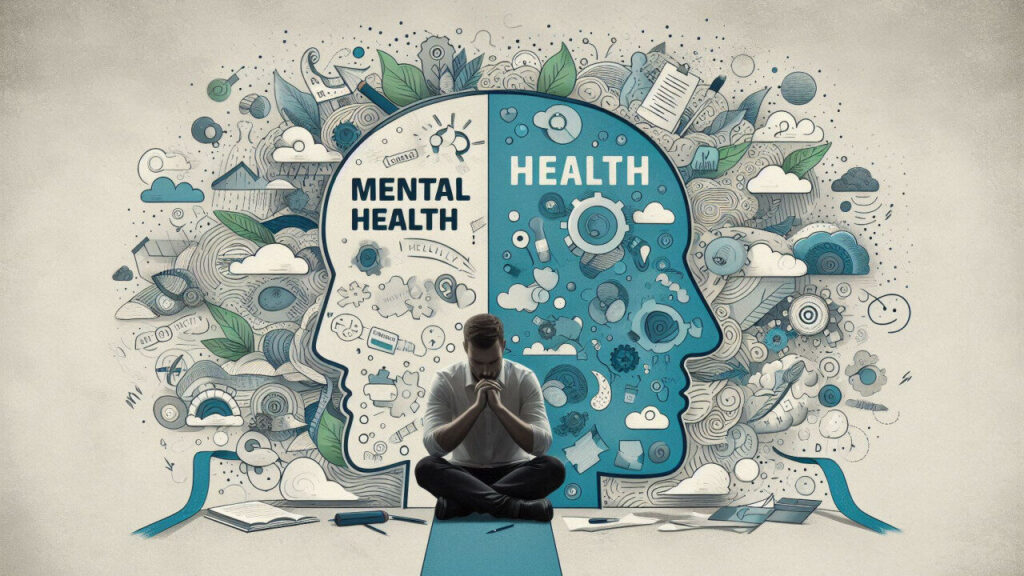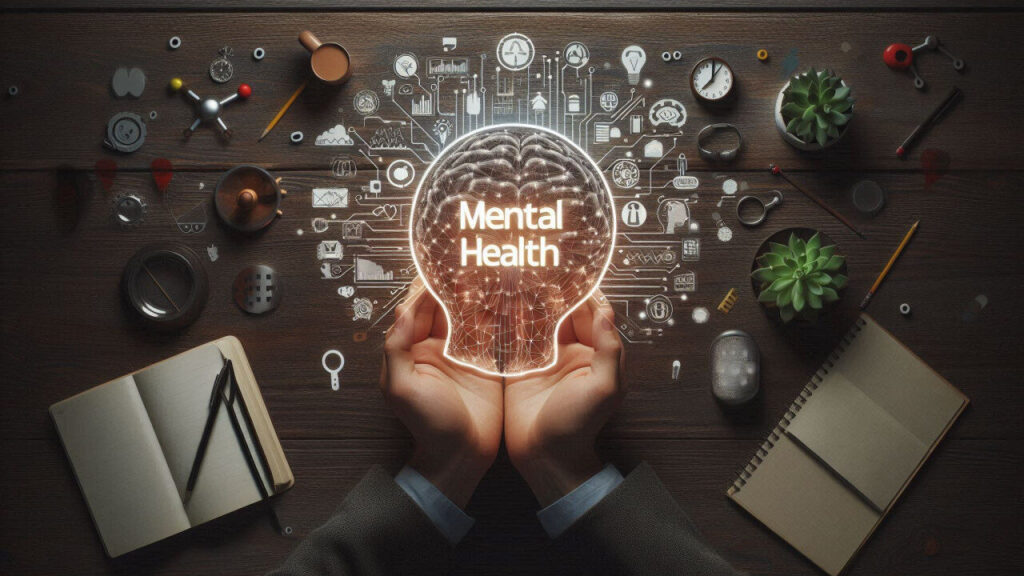Understanding Mental Health: From Perception to Reality

Understanding Mental Health: From Perception to Reality Understanding Mental Health Mental health is a term that you often hear, yet it can remain elusive to many of us: What does it truly mean? How does it influence our daily lives, our work, and our relationships? More importantly, how can we shift our understanding from abstract concepts to something tangible and actionable? This first blog post in the “Mental Health, Well-being, and Resiliency in the Workplace” series seeks to answer these questions. It will lay the foundation for a deeper exploration of mental health, discussing its fluid nature, its interconnection with well-being, and how it impacts everyone – whether they realise it or not. By the end of this post, I hope you will have a better understanding of what mental health is, why it matters, and what small yet meaningful steps you can take to support it in your own life and in the lives of those around you. Table of Contents What Does ‘Mental Health’ Actually Mean? Common Misconceptions and Stigma Why Mental Health and Well-being Are Important for Everyone The Fluidity of Mental Health Practical Steps to Build Awareness and Support Well-being Resources and Support Systems Conclusion: Understanding Mental Health as a Journey What Does ‘Mental Health’ Actually Mean? Mental health is a phrase we often hear, yet its meaning can sometimes feel abstract or difficult to understand. At its core, mental health is about how we think, feel, and behave. It influences how we handle stress, relate to others, and make decisions. In simpler terms, mental health is as much a part of our overall well-being as physical health. Just as we strive to maintain a healthy body, we must also care for our minds. Breaking Down Mental Health into Key Areas To better understand mental health, it helps to think of it as having three interconnected components: Emotional Well-being: This refers to how we manage our feelings and respond to life’s challenges. For example, feeling joy after a personal success or sadness after a loss are natural emotional responses. Psychological Well-being: This involves how we process thoughts, perceptions, and experiences. It shapes how we view ourselves and the world around us. Social Well-being: This is about our relationships and interactions. Building meaningful connections with others can positively impact our mental health, while isolation or strained relationships may have the opposite effect. When these components are in balance, we feel better equipped to face life’s ups and downs. However, just like physical health, our mental health is not static, it fluctuates based on various (often unforeseen or unexpected) factors. The Connection Between Mental Health and Well-being Mental health and well-being are deeply interconnected. Well-being encompasses broader elements of an individual’s satisfaction with life, such as their physical health, relationships, purpose, and personal fulfilment. Things that support well-being such as eating a balanced diet, staying active, getting enough sleep, and engaging in mindfulness activities also enhance our mental health. Consider This: Imagine a 10-year-old child trying to focus in school but skipping breakfast. Their lack of energy makes it harder to concentrate, leaving them feeling frustrated and irritable. This is a simple example of how well-being habits, or the lack thereof, influence mental health. Small changes, like eating a nutritious breakfast, can significantly improve both mental and physical well-being. Relating Mental Health to Everyday Life Mental health is not just about the presence of a mental illness. Everyone experiences fluctuations in their mental health, just as they do with physical health. For example: Feeling anxious before a big presentation or exam. Experiencing joy and excitement when reconnecting with an old friend. Coping with sadness or disappointment after a setback. These are normal responses, yet they highlight the dynamic nature of mental health. It is important to recognise that mental health is not a binary state of being “well” or “unwell“. Instead, it exists on a scale that shifts over time and is different for every single living person. Analogy: The Garden of Mental Health To make this concept more relatable, consider mental health as a garden. A healthy garden requires care – water, sunlight, and regular maintenance. Sometimes, it faces challenges like pests or bad weather, but with attention and effort, it can grow again. Similarly, mental health requires ongoing care. Activities such as relaxation, connecting with loved ones, and seeking help when needed are the “nurturing” elements that keep the garden flourishing. Shaping the Workplace Perspective In the workplace, mental health can influence everything from communication to productivity. However, it is often overlooked or misunderstood. For example, a team member may seem disengaged during meetings, which could be perceived as a lack of interest. In reality, they might be struggling with stress or anxiety. By understanding mental health, workplaces can create environments where employees feel supported and valued. Common Misconceptions and Stigma Mental health is a part of everyone’s life, yet it remains one of the most misunderstood and stigmatised topics. Misconceptions about mental health can create barriers to understanding, support, and recovery, preventing individuals from seeking help when they need it most. Here I will address common misunderstandings, explore how stigma has changed over time, and discuss my thoughts on what still needs to be done. Misconceptions About Mental Health “Mental health only matters if you are unwell” – This belief overlooks the fact that everyone has mental health, just as everyone has physical health. Caring for mental health is not just about addressing an illness, it is about maintaining a mental balance, building resilience, and living your life to the full each and every day. “Struggling with mental health is a sign of weakness” – Mental health challenges are not weaknesses; they are a normal part of being human. Struggling with stress, anxiety, or low confidence does not make someone “less capable“. In fact, seeking help shows strength and self-awareness. “Mental health challenges are rare” – Mental health issues are more common than many people realise. According to UK statistics, 1 in 4
Series Introduction: Mental Health, Well-being, and Resiliency in the Workplace

Series Introduction: Mental Health, Well-being, and Resiliency in the Workplace In a world where mental health is increasingly recognised as a vital aspect of our own and everyone’s lives, it is more important than ever to create spaces where understanding, support, and open conversations are promoted, grow and are trusted. Completing my Level 3 Mental Health First Aid in the Workplace Certification emotionally opened my eyes to the unknown challenges of mental health. It has changed my view, my thoughts, and my understanding, revealing not only the challenges individuals face but also the way mental health touches everyone – even those who, if asked, may believe they have never struggled or suffered with a mental health issue. This new blog series, “Mental Health, Well-being, and Resiliency in the Workplace”, is my effort to bring this understanding to life. By turning abstract ideas into concrete, actionable insights, I hope it will spark conversations, foster awareness, and inspire meaningful change that can transform workplaces and lives. Goals of the Series Educate: Provide clear, comprehensive information about mental health and its role in the workplace and daily life. Empower: Equip readers with knowledge, tools, and strategies to support themselves and others. Inspire Change: Encourage organisations, leaders, and individuals to prioritise mental health as a foundation for well-being and resiliency. Why This Series Matters Mental health is not just a workplace concern; it is a part of life that affects everyone. Yet, many people still struggle to recognise its importance or know where to start. Some may not realise they have experienced mental health challenges or issues, while others face significant barriers to seeking help, such as stigma, cultural expectations, lack of resources, or a lack of knowledge about what support is available. For me, mental health was not something I considered as I grew up. I did not know it was a problem, or even a potential problem, for me or those around me. Looking back now, after completing the Mental Health First Aid Accreditation, I realise that my life has been shaped by experiences that directly relate to mental health and well-being. I have suffered from burnout in the workplace, compounded by presenteeism, where I felt I should not stop working despite the unknown strain on my mental and physical health. Back then, this was almost expected by companies I worked for due to client deadlines incorrectly forecasted. I experienced post-grief challenges after losing both my grandparents within 6 months of each other (back in 1997), my greatest allies and the people who taught me to live life to its fullest. Though I have found peace with their loss (although tears still fall when visiting them at the cemetery), personal anger and unresolved feelings from that time still live quietly within me and always will. In recent years, I have faced anxiety and stress brought on by financial worries and redundancy. The year 2022 was a turning point in my life. Following an unexpected medical emergency (April 2022), I was diagnosed with Type 1 Diabetes, (after varicous veins burst in the throat caused mass loss of blood) a condition that has profound implications for well-being and daily life. In December 2022 (yes the same year), I was rushed to hospital when a brain scan revealed either a tumour or an abscess. The next two weeks of my life are a blur, marked by a loss of memory and cognitive functionality (I have no memory of even eating or sleeping). It was a brain abscess, two emergency surgeries, and my partner saved my life. During my seven-week recovery in Leeds hospital, I relearned aspects of a life I once took for granted, but were fundamentally “out-of-date”. I pushed beyond anything I thought I was capable of (following the surgery), finding strength in the face of unimaginable challenges. Those moments taught me resilience and made me realise how much we often take for granted about mental health, well-being, and recovery. I owe my Fiance, (my Soul Mate ) my life and it was her that drove me to succeed, supported me and listened when I needed to vent frustration. These experiences (and a request from my current employer) led me to pursue my certification as a Mental Health First Aider (MHFA) – This has led to this series (apologies, these posts are not short and not a summary). The course opened my eyes to how mental health touches everyone and how unexpected events can alter the course of someone’s life. I now understand that mental health does not discriminate, it affects anyone, at any time, without warning. This realisation drives me forward. My story is not just one of “posting knowledge” but of advocacy. I am not someone just writing posts about mental health; I am someone who has lived through it, learned from it, and now wants to drive understanding and support for others. The posts in this series are written from a place of deep personal connection, emotional truth, rawness, and a desire to empower others to face their own challenges with strength and support: Warning!! if you adhere to TLDR thoughts, then you will not read these posts, but for those who want to know, understand and break the stigma relating to Mental Health, then I hope you endure the reading, and that its makes you rethink what you thought you knew. For organisations, the stakes are high. Supporting mental health is no longer optional; it is essential. Employee well-being directly influences productivity, employee retention, and success. This series will demonstrate why investing in mental health is not only the right thing to do but also a sound strategy for all organisations. A Message to the Sceptics To those who may question the sincerity of these words or think mental health advocacy is just “empty talk,” I ask you to reflect: What
